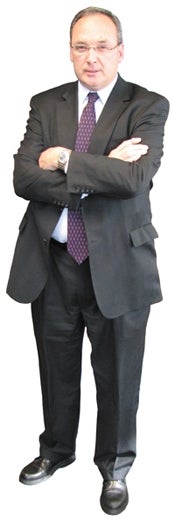Ed Shea first arrived on the Worcester banking scene in 1995 after stints working in Springfield, Cambridge and Portland, Maine. Since that time, Shea’s been a fixture in the local market, and today wears two hats for the financial behemoth Bank of America. His “day job,” as he calls it, is to oversee BOA’s commercial banking operations locally. But he also serves as market president for the bank. Here he discusses what drew him to banking as well as his take on the local economy.
>> How did you get into banking?
I was an economics major at UMass Amherst and I felt like I always wanted to work around money. I didn’t know if I was going to be a stock broker or a banker or what have you until Springfield Institution for Savings offered me a position as a management trainee in 1982. That sounded interesting because I was able to spend time in every department of the bank over the period of a year. Then, when I was done with that, they put me in the residential mortgage lending department. And I just loved it. I loved being able to help people achieve their dreams of home ownership.
WEB ONLY >> You have two positions with Bank of America. One is to head up commercial lending and the other is to serve as market president. Can you explain your responsibilities?
My day jobs is to run business banking from Boston to Sturbridge and my night job is market president. The market president job is a unique challenge and I really enjoy it. I help coordinate our community activities, including charitable giving. And I also help align all the different businesses that operate in the region to make sure our message is consistent, that we all understand each other’s strategies and we’re all marching in the same direction.
>> It seems that the banking market has become more competitive recently. There’s been several acquisitions, most notably United Bank’s purchase of Commonwealth National. What’s your perspective on competition?
I wouldn’t say that the level of competition has changed. What’s really happened is that we had a recession and the demand for credit has been way down compared to prior years. The customers are being more prudent about how they use credit, so we’ve seen lines of credit get paid down, we’ve seen companies defer that capital investment until they’re more sure about where their revenue line is going to be. From that perspective, there are fewer opportunities.
>> What are you hearing from businesses about the economic picture locally?
People are a little more optimistic about where the revenue lines are going. There’s been a little more pickup in demand for credit, although not to levels it had been a few years prior to the recession. But it’s still picking up from its lows of last year. We’re optimistic that this year will be much better than last year. Our chairman of the board publicly announced a $5 billion commitment to lending, which will be a sizeable challenge for all of us, but we’re out there looking for as many opportunities as we can find to make good loans.
>> What makes a business credit worthy?
It’s the same old things. The banks always look for a stable and predictable primary source of payment, operating cash flow from the business. And then we’re going to look for a secondary source of repayment, whether that’s an adequate collateral position and/or the strength of a guarantor who may back it up. Stability and predictability of cash flows has been and will continue to be what the banks primarily look for. We haven’t changed our standards. The issue is that there are fewer companies that hit that today, given the impact the recession’s had on their numbers.
>> Are there particular industries that you’ve seen doing a little bit better?
I was looking at our pipeline of our deals locally and there really hasn’t been one industry that’s done any better than any other one. To me it’s really those companies that are well managed versus not well managed. But then if you take a bird’s eye view of what’s happening, there’s a lot going on. And this we see in the city with the biotech commitment and the opportunities that whole bio-initiative has. It should provide big dividends for us as a region going forward.
>> What’s been the toughest lesson you’ve had to learn as a manager?
My staff works hard on behalf of their clients and they will find every possible way they can to deliver. In some cases I have to be the prudent risk taker and reel them back a little. And that’s challenging. You have to keep people motivated and in this economy it has been challenging because they want to deliver as much as they can and sometimes we have to rein it in a little.
Watch as Market President Ed Shea shares what he enjoys most about his job:

